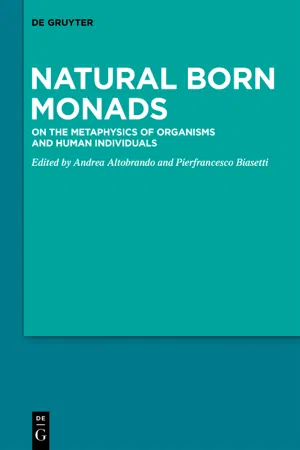
Natural Born Monads
On the Metaphysics of Organisms and Human Individuals
- 343 pages
- English
- ePUB (mobile friendly)
- Available on iOS & Android
Natural Born Monads
On the Metaphysics of Organisms and Human Individuals
About This Book
We are still looking for a satisfactory definition of what makes an individual being a human individual. The understanding of human beings in terms of organism does not seem to be satisfactory, because of its reductionistic flavor. It satisfies our need for autonomy and benefits our lives thanks to its medical applications, but it disappoints our needs for conscious and free, self-determination. For similar reasons, i.e. because of its anti-libertarian tone, an organicistic understanding of the relationship between individual and society has also been rejected, although no truly satisfactory alternative for harmonizing individual and social wellness has been put forth. Thus, a reassessment of the very concepts of individual and organism is needed.
In this book, the authors present a specific line of thought which started with Leibniz' concept of monad in 17 th century, continued through Kant and Hegel, and as a result reached the first Eastern country to attempt to assimilate, as well as confront, with Western philosophy and sciences, i.e. Japan. The line of thought we are tracing has gone on to become one the main voices in current debates in the philosophy of biology, as well as philosophical anthropology, and social philosophy.
As a whole, the volume offers a both historical, and systematic account of one specific understanding of individuals and their environment, which tries to put together its natural embedding, as well as its dialectical nature. Such a historical, systematic map will also allow to better evaluate how life sciences impact our view of our individual lives, of human activities, of institutions, politics, and, finally, of humankind in general.
Frequently asked questions
Information
Table of contents
- Title Page
- Copyright
- Contents
- Natural Born Monads
- Between Laws and Norms. Genesis of the Concept of Organism in Leibniz and in the Early Modern Western Philosophy
- The Ontology of Organismic Agency: A Kantian Approach
- Teleology, Backward Causation and Contradiction. Hegel’s Dialectical Account of Organic Nature
- Being Rational: Hegel on the Human Way of Being
- Hegel and the Question “What Characterizes Human Beings qua Animal Organisms of a Specific Sort?”
- Marx’s Philosophy on Natural History
- From Monads to Monera
- Idealism and Darwin – Rejection, Accommodation, Appropriation: James Hutchison Stirling and David George Ritchie
- Biology and the Philosophy of History: Nishida Kitarō and the Philosophy of “Necessity that Includes Freedom”
- Tanabe Hajime and the Concept of Species: Approaching Nature as a Missing Shade in the Logic of Species
- Teleology, Life, and Cognition: Reconsidering Jonas' Legacy for a Theory of the Organism
- Dialectical Thinking and Science: The Case of Richard Lewontin, Dialectical Biologist
- Can Normativity be the Force of Nature that Solves the Problem of Partes Extra Partes? Episode IV – A New Hope – Natural Detachment and the Case of the Hybrid Hominin
- Towards a Constructivist Approach to Human Nature
- Index of names